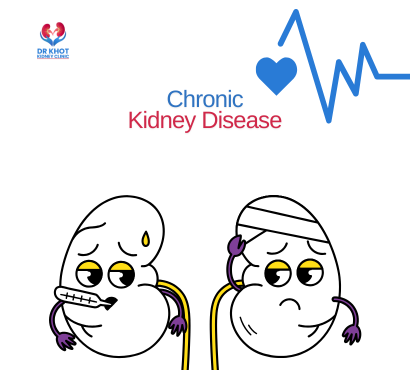Chronic Kidney Disease (CKD) is a progressive condition in which the kidneys gradually lose their ability to filter waste and excess fluids from the blood. Affecting millions worldwide—and increasingly common in India—CKD often goes unnoticed in early stages but can lead to life-threatening complications if left untreated. In this blog, we’ll explore the causes, stages, symptoms, diagnosis, and treatment options for CKD, including lifestyle tips and expert recommendations.
🧠 What is Chronic Kidney Disease?
CKD refers to the gradual loss of kidney function over a period of months or years. The kidneys filter waste, control blood pressure, balance electrolytes, and manage fluid balance in the body. When their function drops below normal levels, toxins start accumulating, affecting various body systems.
🧬 Causes of CKD
- Diabetes (Type 1 and Type 2)
The leading cause of CKD in India. High blood sugar damages the filtering units (glomeruli) in the kidneys. - High Blood Pressure (Hypertension)
Excessive pressure can damage kidney vessels, reducing their ability to function. - Glomerulonephritis
Inflammation of the kidney’s filtering units. Can be acute or chronic. - Polycystic Kidney Disease
An inherited disorder where fluid-filled cysts grow in kidneys. - Prolonged Use of NSAIDs or Painkillers
Overuse of non-steroidal anti-inflammatory drugs (like ibuprofen) can damage kidney tissues. - Urinary Tract Obstruction
Conditions like kidney stones, prostate issues, or tumors can lead to CKD if untreated. - Infections and Autoimmune Diseases
Conditions such as lupus or chronic pyelonephritis can impair kidney health.
🔍 Stages of CKD
CKD is classified into five stages based on the glomerular filtration rate (GFR):
| Stage | GFR (ml/min/1.73 m²) | Description |
| Stage 1 | ≥90 | Kidney damage with normal function |
| Stage 2 | 60-89 | Mild reduction in kidney function |
| Stage 3a | 45-59 | Mild to moderate reduction |
| Stage 3b | 30-44 | Moderate to severe reduction |
| Stage 4 | 15-29 | Severe reduction, preparation for treatment |
| Stage 5 | <15 | Kidney failure (ESRD), dialysis or transplant |
⚠️ Symptoms of CKD
Early-stage CKD is often silent, but as it progresses, symptoms may include:
- Fatigue and weakness
- Swelling in feet, ankles, or hands (edema)
- Nausea or vomiting
- Loss of appetite
- High blood pressure
- Itchy, dry skin
- Shortness of breath
- Muscle cramps
- Frequent urination (especially at night)
- Blood in urine or foamy urine
🩺 How CKD is Diagnosed
- Blood Tests
- Serum creatinine
- eGFR (estimated Glomerular Filtration Rate)
- Urea and electrolytes
- Urine Tests
- Albumin-to-Creatinine Ratio (ACR)
- Dipstick test for protein or blood
- Imaging Tests
- Ultrasound to check kidney size and shape
- Kidney Biopsy
In some cases, to confirm specific causes.
🥗 Treatment Options for CKD
1. Medical Management
- Blood Pressure Control: ACE inhibitors or ARBs are used to protect kidneys.
- Diabetes Management: Maintaining HbA1c <7% is key.
- Cholesterol-lowering medications
- Erythropoietin injections: To treat anemia due to CKD.
- Phosphate binders & Vitamin D supplements: For bone health.
2. Dietary Changes (CKD Diet in India)
- Reduce sodium: Less than 2g/day (avoid pickles, papads, salty snacks)
- Limit protein intake: Especially in stages 3-5
- Control potassium & phosphorus: Bananas, oranges, nuts may need restriction
- Stay hydrated: As advised by the nephrologist
Common Indian foods to avoid in CKD:
- Paneer, urad dal, chole (high protein)
- Coconut water, banana, jackfruit (high potassium)
- Processed foods with preservatives
3. Dialysis
When kidneys fail (Stage 5), dialysis may be needed:
- Hemodialysis: 2-3 sessions per week via a fistula or catheter
- Peritoneal Dialysis: Can be done at home using the peritoneal lining as a filter
4. Kidney Transplant
The best long-term solution for ESRD. Requires a healthy donor match and lifelong immunosuppressants.
🧘♀️ Lifestyle Changes for CKD Patients
- Quit smoking and alcohol
- Control blood sugar and BP
- Engage in moderate physical activity
- Monitor weight and cholesterol
- Avoid self-medication or over-the-counter painkillers
- Follow up with a nephrologist regularly
📉 Complications of Untreated CKD
- Cardiovascular disease
- Kidney failure (requiring dialysis or transplant)
- Anemia
- Weak bones and fractures
- Fluid overload and pulmonary edema
- High potassium levels (can cause heart issues)
🧑⚕️ When to See a Nephrologist?
You should consult a nephrologist if you experience:
- Persistent high BP
- Blood in urine
- Swelling in legs or puffiness around eyes
- Reduced urine output
- Abnormal blood/urine reports
Early referral ensures better long-term outcomes.
🖼️ Suggested Images/Diagrams to Include:
- Kidney anatomy diagram
- CKD stages chart (included above)
- Indian diet plan chart for CKD patients
- Dialysis process infographic
- Comparison of normal vs CKD-affected kidneys
Chronic Kidney Disease is a silent but serious condition that requires proactive monitoring, lifestyle changes, and medical intervention. In India, with rising diabetes and hypertension rates, CKD is becoming increasingly prevalent—even among younger individuals. Early screening, managing comorbidities, and following a renal-friendly lifestyle can drastically improve quality of life and delay progression.
If you or a loved one experiences any symptoms or risk factors mentioned above, consult a nephrologist immediately. Prevention and early action are the best medicine.
FAQ
Q1. Can CKD be reversed completely?
No, CKD is a chronic condition and usually progressive. However, early diagnosis and proper management can slow or even halt progression in some cases.
Q2. Is dialysis painful?
Hemodialysis itself is not painful, but insertion of needles or complications like cramping may cause discomfort. Peritoneal dialysis is usually gentler.
Q3. What foods should be avoided in CKD for Indian patients?
Avoid high-potassium and high-sodium foods such as bananas, pickles, papads, fried snacks, processed foods, red meats, and dairy-heavy dishes unless advised otherwise.

